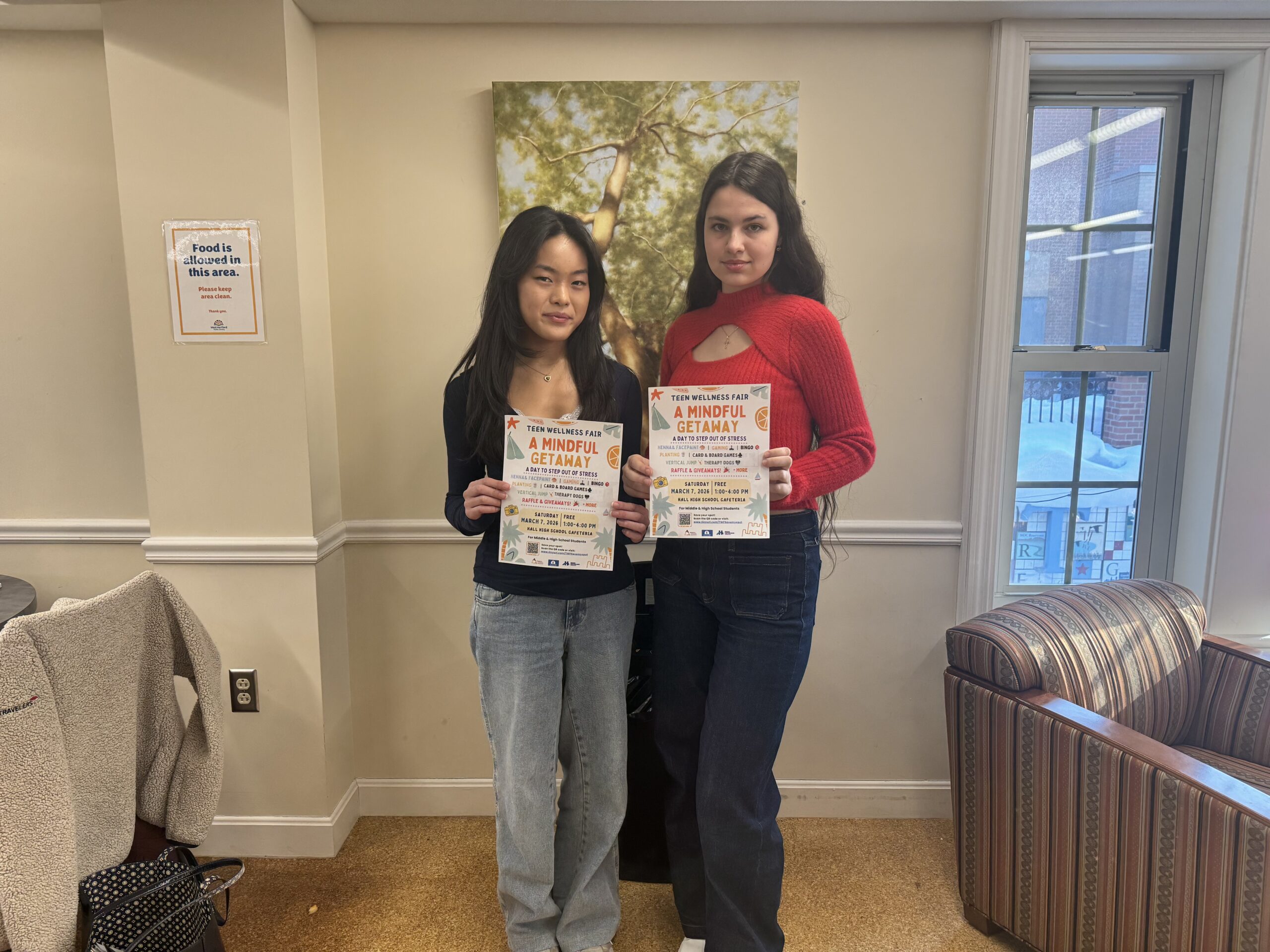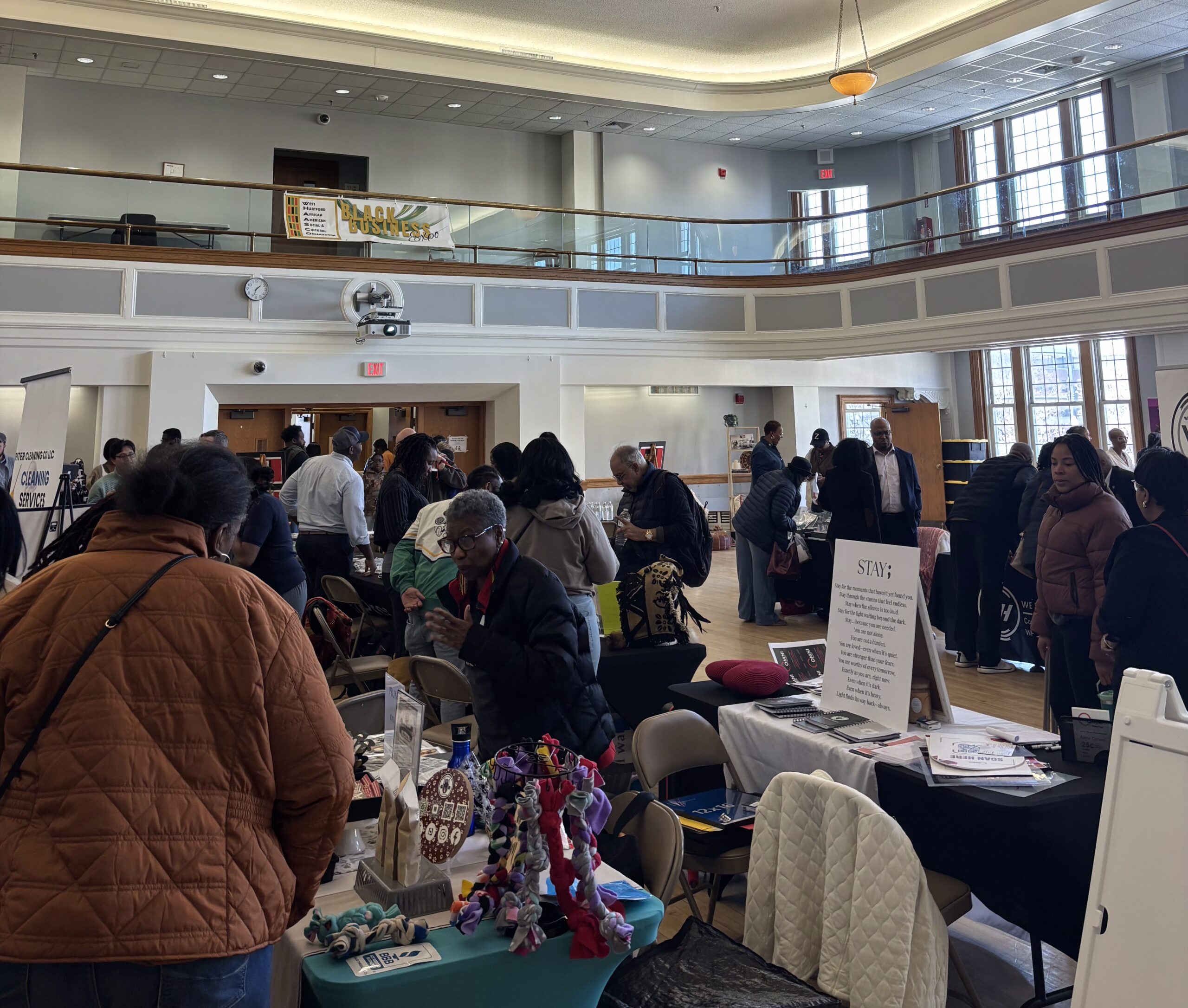Carl Bennett, founder of Caldor and Bennett Center for Judaic Studies, dies at 101

Audio By Carbonatix

Carl Bennett, left, holding the Torah alongside Rabbi Daniel Cohen at Congregation Agudath Sholom in Stamford. (Date unknown). Photo courtesy of Southern New England Jewish Ledger
The founder of Caldor Department Store, which had a location for many years at 983 New Britain Ave. in the Elmwood section of West Hartford before closing in 1999, passed away in late 2021.
By Stacey Dresner
Carl and Dorothy Bennett were at Fairfield University’s President’s Gala for donors at the Waldorf Astoria in 1987 when they began chatting with Philip Eliasoph, one of the few Jewish faculty members at the private Jesuit Catholic university.
Eliasoph, a professor of Art History and founder of the college’s Visions Lecture Series, took the opportunity to suggest inviting a “Jewish speaker to our little Catholic campus” and calling it the Bennett Lecture.
Carl Bennett instantly opened his wallet, took out his business card and handed it to Eliasoph, saying, “Call my secretary Connie at the office on Monday.’”
That exchange was one of the sparks that eventually led to the creation of Fairfield University’s Carl and Dorothy Bennett Center for Judaic Studies, now a renowned center for academics as well as Jewish cultural events for the entire community, both Jewish and Christian.
The Center is just one example of the philanthropic generosity and foresight of Carl Bennett, who died on Dec. 23 at his home in Greenwich at the age of 101.
The founder of Caldor Department Store, known for building his company from one small store in 1951 to a chain with $1 billion in sales by 1983, was, along with Dorothy, who died in 2008, dedicated to their community, education, health, medical research and the State of Israel.
“Judaism teaches that we have three names,” said Rabbi Daniel Cohen of Congregation Agudath Shalom, Bennett’s longtime synagogue. “The first we are given when we are born, the second is the name given by our friends and the third is the most important which is the name we acquire in our lifetimes. Carl Bennett, of blessed memory, possessed a shem tov, a good name in the truest sense.
“He was an astute, successful businessman who offered wise counsel to shul leadership. He was a generous and kind person, a mensch, with a warm smile and twinkle in his eye. He will not only live on within his family, community, Stamford hospital and much more but also within the walls of our shul as he was very much a part of our history and growth.”
The son of Mayer and Rebecca Bennett, Carl Bennett was born in Greenwich and raised above his father’s grocery store, Bennett Grocers, on Steamboat Road. Bennett credited his father for his love of retailing.
After graduating from Greenwich High School and attending New York University, he served during World War II in the 466th Quartermaster Battalion. When he returned home from his tour of duty, he became a wholesale liquor salesman for Connecticut Distributors in Norwalk.
He met Dorothy Becker of Forest Hills, New York, and they soon married. According to Bennett’s obituary, the couple was shopping together at E.J. Korvettes Department Store one day when Carl came up with the idea to open his own discount store, combining his name with Dorothy’s to form Caldor.
With $8,000 saved from his military duty, and $50,000 more borrowed from a local bank, the Bennetts opened their first store, soon expanding to Stamford, Norwalk, and Riverside.
In 1981, the 120-store chain was sold to Associated Dry Goods for $313 million. He retired as chairman and CEO in 1984.
Over the years, the Bennetts donated to a variety of organizations in lower Connecticut and beyond. Besides the Bennett Center at Fairfield University, they also endowed the Bennett Cancer Center at Stamford Hospital and gave generously to Greenwich Hospital, Jewish Senior Services in Bridgeport, The Weitzmann Institute in Rehovot, Israel and Yeshiva University.
The Bennett’s became involved with Fairfield University through their daughter, Robin Bennett Kanerek, who graduated from Fairfield’s School of Nursing. Dorothy became an active member of the university’s board of trustees.
And that is how Carl and Dorothy ended up at the Waldorf-Astoria in 1987 at the President’s Gala given by Father Aloysius Kelly, who had become a good friend.
After getting Carl’s business card that evening, Prof. Philip Eliasoph did end up calling Bennett’s office a few days later.
Eliasoph told Bennett that they could get Israeli author Amos Oz to speak at Fairfield for $2,500.
Bennett had other ideas.
“He said, ‘Look, professor, if we are going to do a Lectureship in our name – it has to be the very top Judaic speaker in the world right now,” Eliasoph recalled.
Bennett’s pick? Ambassador Abba Eban.
Bennett had already spoken to the agency representing Eban and he told Eliasoph it would cost $12,500, which he would fund.
“This was his genius,” Eliasoph said. “He knew how to make something happen and he knew how to do it the right way.”
The next year, Abba Eban stood before a crowd of students, faculty and members of the local Jewish community, giving what would become the first in the Carl and Dorothy Bennett Judaic Lecture Series.
Several Jewish speakers later, in 1993, the Bennetts agreed to give $1.5 million to Fairfield University to endow a senior chair in Judaic studies with the Department of Religious Studies.
That chair was Ellen Umansky, who created the university’s undergraduate minor in Judaic studies, and has served as the Carl and Dorothy Bennett Professor of Judaic studies and director of the Bennett Center since 1994.
“I was just so proud and still am proud to be the Carl and Dorothy Bennett professor because both Dorothy and Carl were just wonderful people, and really philanthropic in the best sense of the word,” Umansky said. “In addition to that initial endowment he has continued to make a substantial financial gift to the Bennett Center every year which has enabled us to continue the quantity and quality of the programming that we have had.”
“There are some people who have an endowed professorship and they don’t even know the person, they just give them the money, but Carl wasn’t someone who just gave money to the university.”
Umansky worked with Bennett every year on who to bring in to give the Bennett Lecture.
“He would send me his ideas and little notes on pieces of paper, or he would clip things out of the newspaper about high profile scholars he had heard of. He would send me these notes until maybe three years ago. He usually wanted me to bring in someone on the level of Abba Eban, if Abba Eban was still around.”
Umansky also called Bennett a good friend and advocate.
She recalls that when she first arrived in Fairfield, Bennett asked his good friend Rabbi Joseph Ehrenkranz z”l if she could give the sermon on the bimah at Congregation Agudath Sholom on Shabbat morning.
“This was, and is, a modern Orthodox synagogue. And it shows you the high regard in which Carl was held that Rabbi Ehrenkranz said yes,” Umansky said.
“I sat with Dorothy in the women’s section and then after the Torah reading I got up to speak. My [now] ex-husband said that there were several men who walked out when I started to speak, and there were a few that buried their heads in the prayer book. But I thought it was incredible. First of all it said something about Agudath Sholom, but also just the fact that this was important to Carl, that I was a woman, yes, and this was an Orthodox synagogue, yes, but he felt it was important for me to share my knowledge on the parsha with his congregation.”
“He was a dear friend and pillar of Agudath Sholom for decades,” said Rabbi Cohen. “Carl was a longtime dedicated and strong supporter of our shul. He loved yiddishkeit. He looked forward to chanting his Haftorah on the first day of Rosh Hashanah. He sponsored many Cantor concerts and Jewish musical groups. He and his wife, Dorothy made the building we have enjoyed for so many years, a warm and welcoming place. The Bennett Simcha room prior to renovation was the home of so many events and memories in our shul. They lived their lives with purpose and harnessed their blessings to truly leave our community and world a much better place.”
In recent years, Bennett began attending services at the Temple Sholom in Greenwich which was closer to his home.
He still attended events at the Bennett Center even in his later years when he was wheelchair bound.
Because of his love of Jewish music, his daughter Robin and Umansky planned a Zoom concert for his 100th birthday in 2020, led by Cantor Avi Schwartz from New York’s Park Avenue Synagogue and its choir performing a special program of Bennett’s favorite Jewish songs.
“Carl loved it and it was so great that we were able to celebrate his 100th birthday in a way that would prove to be very meaningful for him,” Umansky said.
Always a supporter of Israel, Bennett received Israel’s Prime Minister Award for distinguished service in 1973.
He was awarded Discounter of the Year in 1982 and was inducted into the Retailer Hall of Fame in 1983 along with his good friend, Sam Walton, founder of Wal-Mart.
Through the Carl and Dorothy Bennett Foundation, Bennett made sure that even after he was gone that the organizations he and Dorothy loved would continue to be supported, including the Bennett Center for Judaic Studies.
“The Bennett Center has been a wonderful gift to the community and a gift to our students,” said Prof. Eliasoph. “What could be greater than to bring light to Jewish students, to Catholic students by teaching them Jewish history, culture and faith? It’s a mechiah [a delight]. And it’s a legacy that would be hard to match.”
Carl Bennett is survived by his three children, Marc Bennett of Stamford, Robin Kanarek and her husband Joseph of Greenwich, and Bruce Bennett and his wife Jennifer of Rochester, New York, and five grandchildren. He was predeceased by his wife Dorothy in 2008 and his grandson, David Kanarek.
A version of this story was originally published in the Jan. 13, 2022 issue of the Southern New England Jewish Ledger. Republished with permission.
Like what you see here? Click here to subscribe to We-Ha’s newsletter so you’ll always be in the know about what’s happening in West Hartford, and click here to become a supporter of We-Ha.com and our efforts to continue producing quality journalism.



